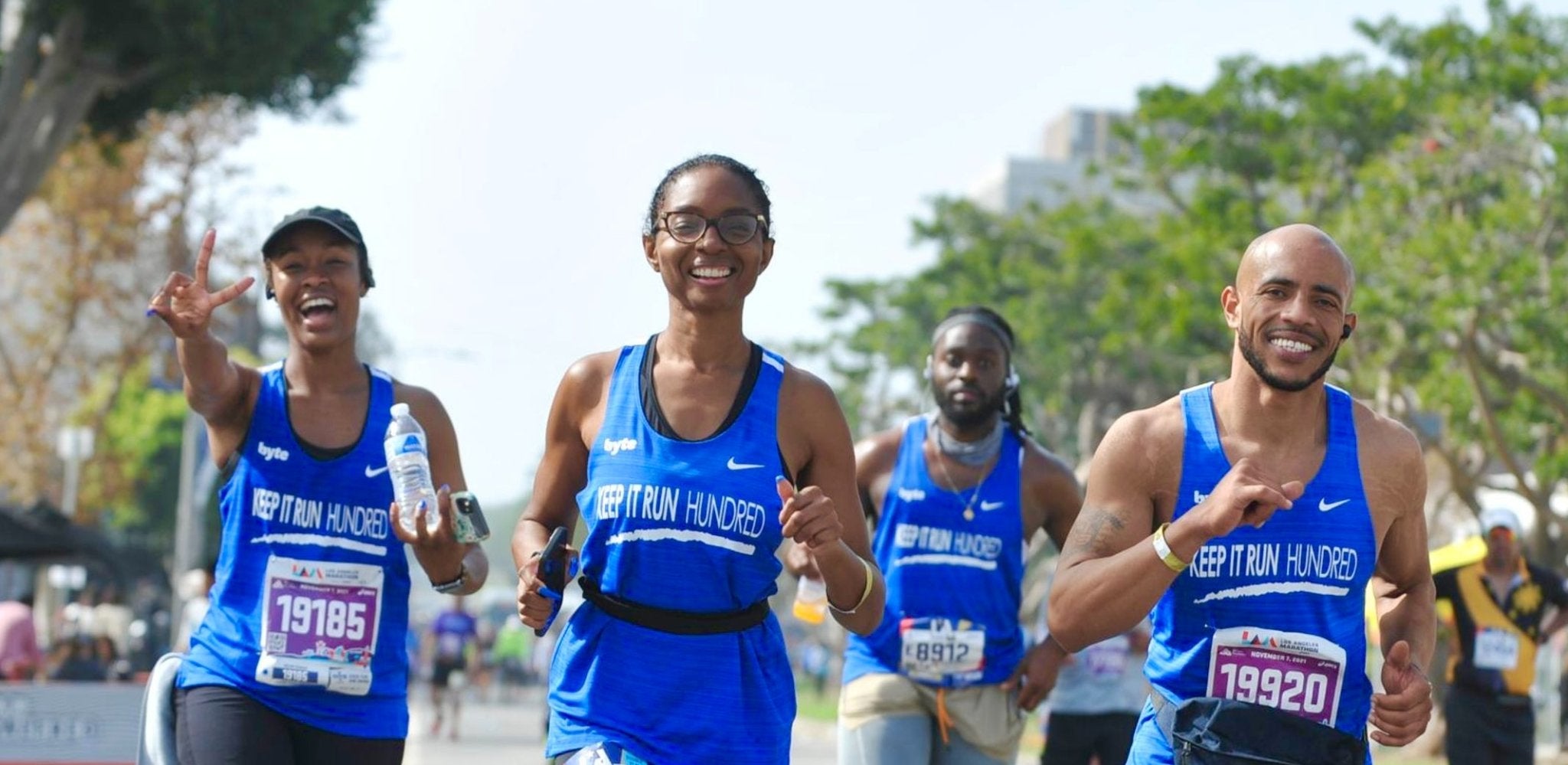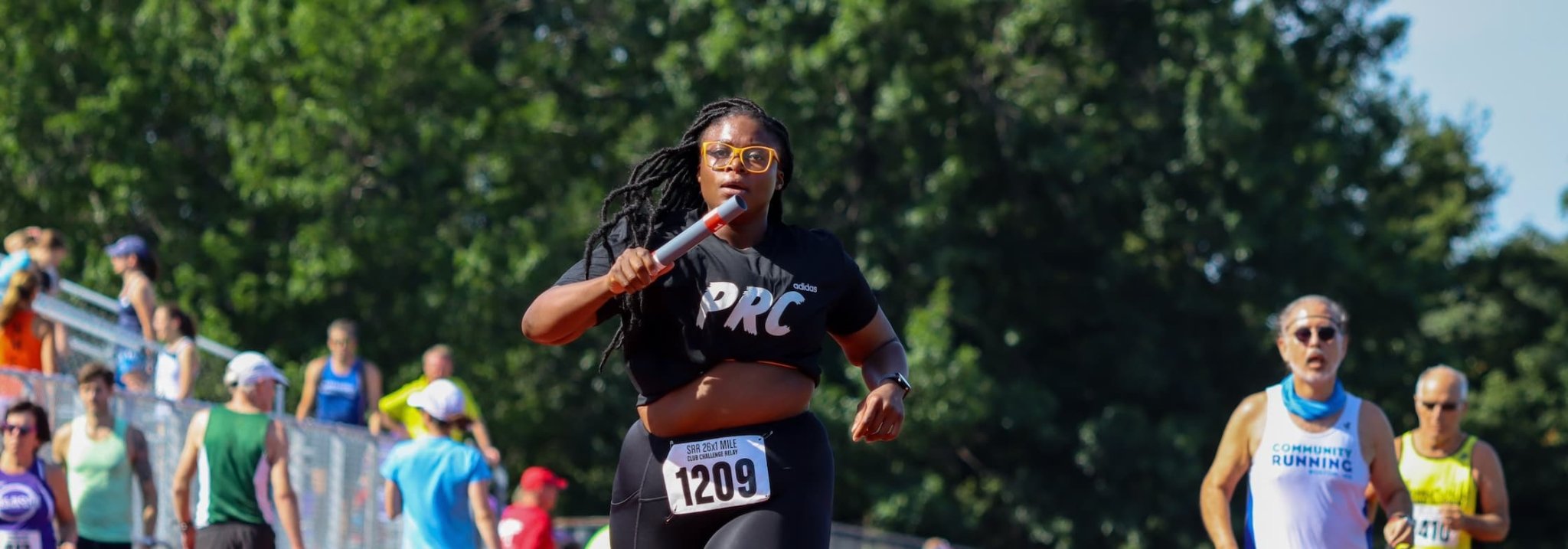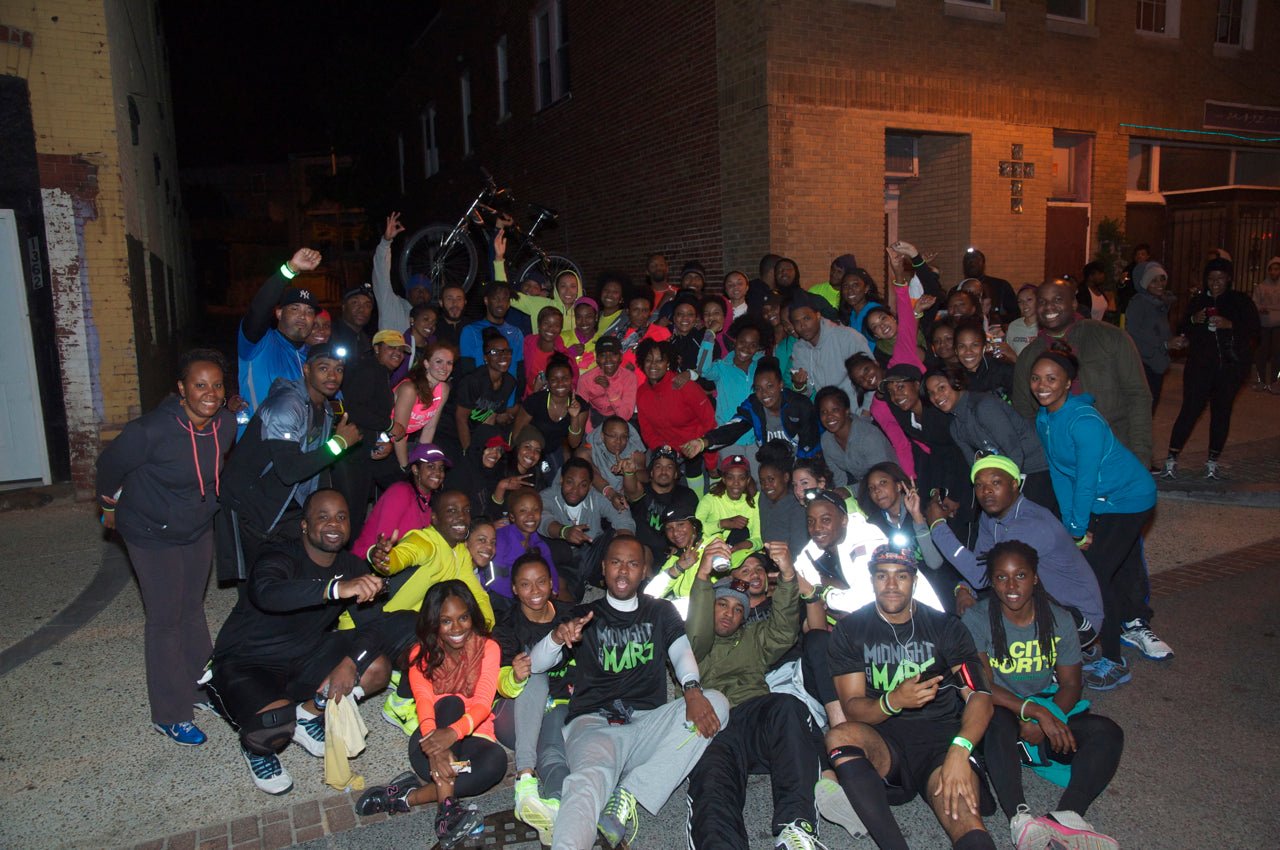The inside story of how District Running Collective spawned DC’s very own take on Black Running Culture - with community right at its heart.

"I've visited other cities, but DC has its own vibe, it's own calling," muses Paul Robinson.
There are few organizations, groups or communities in DC that embody this more than District Running Collective. Since 2013, DRC has proudly displayed their unique brand of fitness and fun on the streets of NW Washington DC.
DRC operates right in the heart of the community - literally. In 2019 they opened "The DRC Space" in collaboration with Under Armour. The interior of this stylish community hub is inspired throughout by running culture. It's the starting point for DRC’s weekly runs and also hosts events and workshops focused on performance, recovery, and community.
It's in this unique urban space that we caught up with Paul (who has been running - and smiling! - with DRC for over 5 years) and Matthew Green, co-founder of DRC and the driving force behind their continual drive to push boundaries and innovate within running culture.
Their personal stories paint a picture of just how far DRC has come, and just how big an impact the group has had - and continues to have - on the people of DC.
Like many of their peers within the urban running culture scene, neither Paul nor Matt saw distance running as a sport that was for them, or necessarily accessible to them, when growing up.
"The first sport I ever played was soccer at the local recreation center - I really didn’t know what I was doing", laughs Paul. “I had a good time, but I didn't really play any other sports as a child."

In contrast, Matt tried his hand at a number of sports without any of them really sticking. "Growing up I was always into sports. Baseball, basketball, soccer," he explains. "I was a private school brat so I played all the sports! But I never really shined at any - and I was always the shortest player."
Eventually, both men found their way onto the track, finding success - and in Paul's case a sense of enjoyment - running short distance events.
"At the time I got commissioned as a ROTC Officer [Reserve Officers' Training Corps] and I didn’t have anything else to do," says Paul. "I wanted to take on something else - so I ran indoor and outdoor Track for the first time. It was fun!"
"I ran the 4x4 relay. I started because I'm fast out the gate," he laughs. "You could see that when I was running today, I was going strong… until the fatigue kicked in!"
Matt started running Track in 8th grade, where it was clear he had ability. Ultimately however, his passions lay elsewhere.
"I could have been great," says Matt, reflectively. "And my coach agreed. He told me that when I talked to him again recently… I wish he would have said that sooner! But in all honesty I probably wouldn’t have listened - I was too focused on trying to play football at the time."
"For a lot of black athletes, long distance running and endurance comes with a negative connotation"

In subsequent years, both Paul and Matt discovered the benefits of distance running - if not a passion for it. For the most part, running was a means to an end. For Paul it was simply a way of staying fit and healthy:
"After high school, running became exercise for me," explains Paul. "I ran about three times a week, doing 3-4 miles, straight out from my house and through the city."
"Running for me was about cardio. A lot of people go to the gym and just work on legs, lift weights, do pull-ups, etc. But running does everything - your arms, legs, breathing, heart rate. Coming from a family where there is a history of hereditary illnesses like diabetes, keeping healthy is very important to me."
Matt, meanwhile, had found a passion for wrestling - and discovered just how beneficial running can be when it comes to competing in other disciplines.
"My freshman year I found a love for wrestling - I liked the challenge of a 1v1 sport," says Matt. "It was all about technical skills, style and endurance. I did a lot of conditioning, including running. Wrestling was my passion, every medal and every loss was on me. It helped me develop into the man I am today, for sure."
"And when it came to wrestling", Matt continues, "it was running that actually got you to be really good - to be able to go 2 minute periods for three rounds. The more running you did, the more in shape you got."
Despite having a genuine appreciation and respect for running, neither Paul nor Matt took their running to the next level - or made it a more important part of their lives. Matt's thoughts on Black athletes and running offer us an insight as to why:
"My relationship to running, when it came to sports in general, was always a punishment type of mentality," he explains. "Like suicide drills in basketball, or punishment laps on the field."
"For a lot of Black athletes, long distance running and endurance comes with a negative connotation. Running is a punishment."

Matt's mentality toward running, however, didn't stay the same forever. Slowly but steadily, the early 2010s saw a change in attitudes to running among people in Black communities. Matt takes us back to that time - and the events that inspired the creation of one of DC's first running crews.
"They had artists, DJs... people who looked like me... it was dope"
As he reached twenties, Matt began to run more frequently. Initially he ran for health reasons, but it wasn’t long before he began to notice a paradigm shift in running culture.
"I was 24 at that point," Matt recalls. "And my metabolism had changed. At that age if you're going out and partying in DC - you've got to start working out! Running became one of the main things that I did."
"At the time I witnessed the culture shift running was going through," he continues. "In New York I started seeing really dope crews doing stuff that had to do with running. They had artists, DJs, and the people at those events were people who looked like me - not some 40 year old white guy. I thought 'These people run half marathons? It doesn't make any sense!'."
More specifically, it was at one of the legendary Bridge Runners parties in New York that lit a fire in the hearts and minds of Matt and DRC's other co-founders.
"I'll never forget it," Matt says. "Black Roses [a New York Running Crew] pulled up in a black van with Nike bombers, joggers, racers, printed jackets, vinyl on the van… everything exclusive and cool as hell! I was like 'this shit's crazy'."
"Meeting them and talking to them gave us the energy to start our own thing, it was the battery in our back. But they didn’t actually give us much info!" laughs Matt. "They were very chill and New York about it."
Freshly energized and inspired, the group of co-founders were set on taking that same energy back to DC - and Matt's own birthday became the night that was pivotal to DRC's creation.
"So for my 26th Birthday, I wanted to do a midnight 5k on 8th street," Matt explains. "It was before the area was gentrified, so it was still a little gritty in certain areas. We used a bar as the base for the midnight run and over 100 people showed up just from our network."
"It was hella black and we turned the hell up at the end. It was just dope. I thought 'Pow - we got something here'. And DRC spawned."

"Before long we started traveling everywhere. It started with New York, we'd go to events to show our faces and to rep DRC on our chest."
"Seeing how people were out there, my people, there was just something different about it"
We pick up the story with Paul, who started running with DRC in 2016, and who saw straight away that DRC was doing something different to anything he'd experienced previously.
"A fraternity brother lived down the street from one of the locations where DRC used to meet," Paul recalls. "He hit me up one day and said 'Hey, there's this run group that meets up the street from my house every Wednesday - wanna come check them out?'."
"I said 'sure, let's check it out'," he continues. "And then… man… seeing how people were out there, my people, there was just something different about it. A whole crew of people - it looked fun, it looked like we were gonna party."
"At the beginning I simply saw it as a good way to get some exercise in. But then the challenge aspect came in: I was running with and around people who were much faster than I was and trying to keep up!"
"When you run at your own pace, with nobody around you to push you, you can run a little bit slower. But when you have people around you, next to you, behind you, you push yourself further."

"It was just… fun," Paul concludes. "I ran before, but it wasn't until I started running with DRC that it became more than just running."
"We took people to places they'd never been before, met people they probably wouldn’t have if it wasn’t for running"
Paul is clear not only about the impact that DRC has had on his life, but also the impact it’s had on people like him in DC.
"Family is everything to me, and I look at DRC as a family," Paul explains. "I've been with them on so many trips - we ran on the beach, ran abroad (London), we've run in Miami. Running with DRC drives me to want to do something great. I saw that in the beginning, and that's why I've been here ever since."
"But the beauty of it is not just me running with people I know. It's the people who see me through social media - who then get motivated to go out there and run as well."
'A guy I went to high school with saw me and stopped me one day," Paul continues. "He said, 'Man, Paul I see you running all the time'. His daughter saw me too, and asked her dad if he wanted to go running. He said 'If my man Paul's running, I’m gonna be running out there too!'."
For the first time, people like Paul, as well as others in Black communities in DC, had a gateway into running that they felt they could be a part of.
"It's all about community," co-founder Matt explains. "The folks that come out and run with us, the people and the organizations that support us. We went from 'we want to make this shit look cool' at the beginning of DRC, to 'we want to build this community' today.
"It's an entry way for people to come into running. Seeing people that look like you and having them come through. We created a place where people could come and connect in a way that wasn't a networking happy hour, that wasn't posh, or somewhere you had to wear and suit and be asked about your job."

"We took a social activity, combined it with stuff we like - hip-hop-bars, partying - and then we also have a health consciousness to it. As DRC expanded, we traveled and took people to places they'd never been before, met people they probably wouldn’t have if it wasn’t for running."
"We have to keep pushing the barriers, keep being leaders, innovators"
Running is never about moving sideways, it's about progressing forward. As our conversations with both Paul and Matt come to a close, we turn to future goals, for both themselves as individuals as well as for DRC.
"The impact DRC has is real," Matt says. "You meet people who never thought they could run a marathon - and then they run one! You see that feeling of accomplishment on their face, with their family there to support them."
But the impact of DRC goes well beyond physical fitness, as Matt is well aware:
"People come up to me and say 'You changed my life! I was going down this road and the thing you are building at DRC changed how I move, how I operate, and made me a better person'."
"After hearing stories like that, I realized DRC is bigger than me," Matt continues. "DRC is it's own thing - it needs to exist, it's helping people out, and it’s a staple in the city. When people in this part of the city think running, they think DRC."
"So we have to keep pushing the barriers, keep being leaders, innovators - and not get stagnant. For myself, as a creative," Matt adds, "I want to move things forward in a way that people say ‘ain’t nobody done this before… DRC has done it again!'."
You need only to speak to Paul to understand what running with a group of like-minded people can help you achieve - and help you believe you can achieve in the future.
"I've had a lot of goals in this running journey," laughs Paul. I've run 5k, 10k, 10 miles, a half marathon, the District 19 Race (DRC’s very own event). One of my complete running goals is to run a marathon. It’s a little intimidating, but I'm up for the challenge. I'm always up for a challenge!"
"Running is therapy for me," Paul continues. "Not every day is a good day, so it's important for me to be able to get out and put everything on the pavement. Everything in the universe that I'm feeling - family pressure, work pressure, finances. I can drain myself of all of that negativity and put it to something useful."

We end on a particularly poignant example of how this works in practice.
"I had a good buddy from my undergrad years who passed today, from COVID", says Paul, who for the first time during our conversation becomes quiet and reflective.
"The fact that he's not here anymore… I feel the weight of it. So even though I was tired earlier, I went out there and ran, and pushed - I pushed in remembrance of him."
"He caught COVID doing something he loved", Paul continues. "You've got to treat every day as special and live it up to it’s last. We never know when our last day will be, so let's finish each day doing something that we love."
Each Wednesday evening at 11th Street, Northeast Washington - you'll find Paul, Matt and the incredible DRC running community doing just that.

Sidney Baptista is a running coach, leader & activist who founded PIONEERS Run Crew in Boston. Matthew Greenwood is a co-founder of District Running Collective in Washington DC. Paul Robinson has been running with DRC since 2016.
Read more

How South Central LA's running community came together to support a young woman through one of her biggest challenges - and come back stronger than ever.

The co-founder of the Bra Run and pioneering women's running crew TrailblazHers opens up about losing weight in the public eye, running marathons, and empowering women of color. The grit, the grind...

